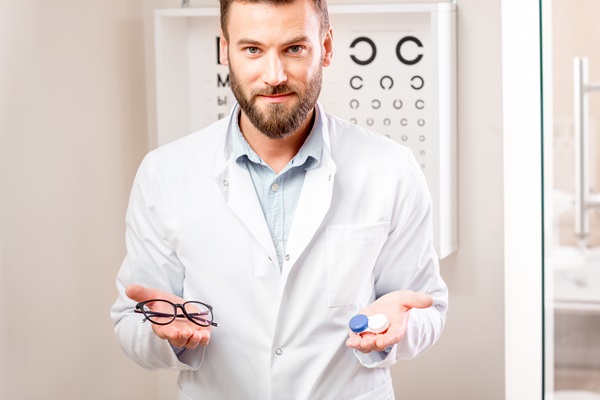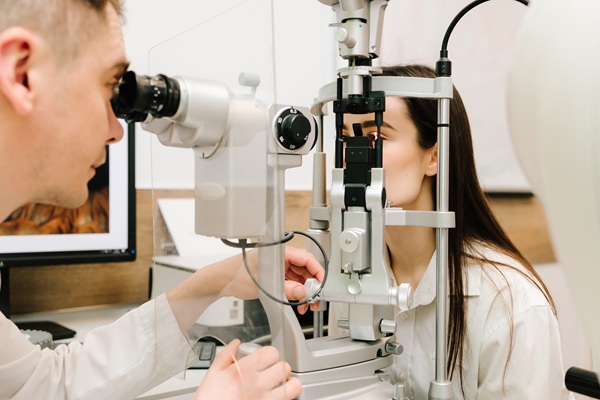What Is an Ophthalmologist?

An ophthalmologist is one of several types of professionals who have a specific role to play in the field of vision health. Along with optometrists and opticians, an ophthalmologist can make up a part of a comprehensive eye care team. The similar-sounding names of these three types of providers can cause confusion among patients. However, each has training and skills specific to the tasks they have to perform. Knowing the differences can help patients seek out the specific professional best suited to address their needs.
Difference between an ophthalmologist and other eye care professionals
Opticians, optometrists and ophthalmologists each have different tasks to perform within the field of eye care:
- Opticians: Fill prescriptions for glasses and contact lenses, making adjustments and repairs as needed
- Optometrists: Perform vision tests and eye exams, and prescribe corrective lenses to treat certain eye conditions
- Ophthalmologists: Diagnose and treat diseases of the eye while providing vision services similar to what an optometrist does
Differences between an ophthalmologist and an optometrist
The main difference between an optometrist and an ophthalmologist is that the latter is a medical doctor. Optometrists hold a four-year Doctor of Optometry degree, which allows them to provide primary vision health care in the form of vision tests, eye exams and prescriptions for corrective lenses. While performing screening tests as part of a routine eye exam, an optometrist may detect signs of an eye disease, such as glaucoma, diabetic retinopathy or cataracts. However, an optometrist is unable to treat such a disease and will therefore likely refer the patient to an ophthalmologist.
As a medical doctor, an ophthalmologist has received approximately three times the education and training that an optometrist has, having completed a degree program that lasts approximately 12 to 13 years. A doctor of ophthalmology can perform all the same services that an optometrist can but can also do much more besides. In addition to merely diagnosing disorders of the eye, an ophthalmologist can provide treatment as well. Sometimes this includes performing surgery to remove cataracts, correct vision or raise eyelids that have become droopy with age.
Specialization within the ophthalmology field
Ophthalmology is already a specialized field of medicine, sometimes entailing a one- to two-year fellowship in addition to the combined eight years of undergraduate studies and medical school, plus the three-year residency, required to obtain an MD degree. The fellowship provides in-depth training in a subspecialty within the field of ophthalmology. With a subspecialty, an ophthalmologist can provide care in the particular area that is of greatest professional interest. Examples of subspecialties include pediatric ophthalmology, oculoplastic surgery and diseases specifically affecting the cornea or retina.
Conclusion
The human eye is one of the most complicated structures in the body. While some can receive sufficient care from an optometrist and may never require a doctor of ophthalmology, many patients require the services of a comprehensive eye care team that includes an ophthalmologist, an optician and an optometrist to diagnose and treat whatever specific eye health issues that may arise.
Request an appointment here: https://brighteyesny.com or call Bright Eyes Optometry at (914) 730-9574 for an appointment in our New Rochelle office.
Check out what others are saying about our services on Yelp: Ophthalmologist in New Rochelle, NY.
Recent Posts
Ophthalmologist and optometrists are two of the main eye care professionals. Both play an important part in helping you maintain the health and function of your eyes. However, while each type of eye doctor provides vision care, knowing the care you need can be confusing. Choosing the appropriate eye care provider depends on individual needs,…
Sunglasses have become a part of many people's wardrobes; however, they are also a great tool for protecting the eyes. Along with playing a large role in our daily lives, eyes are also sensitive to many things—sunlight being one of them. It is easy for one's eyes to sustain damage from direct sunlight exposure. Thankfully,…
A comprehensive eye exam does more than assess vision; it can also reveal early signs of various health conditions. Many systemic diseases affect the eyes before other symptoms appear, making regular exams essential to overall health care. Optometrists use advanced diagnostic techniques to detect conditions beyond vision problems, allowing for early intervention and treatment.Routine eye…
Cataracts are a common vision impairment that primarily affects older individuals, leading to clouded visions and, in some cases, blindness. Fortunately, cataract treatment provides effective solutions to restore sight and improve people's overall quality of life. Optometrists can use these advanced methods to improve precision, reduce recovery time, and lead to better treatment outcomes.Cataracts develop…


